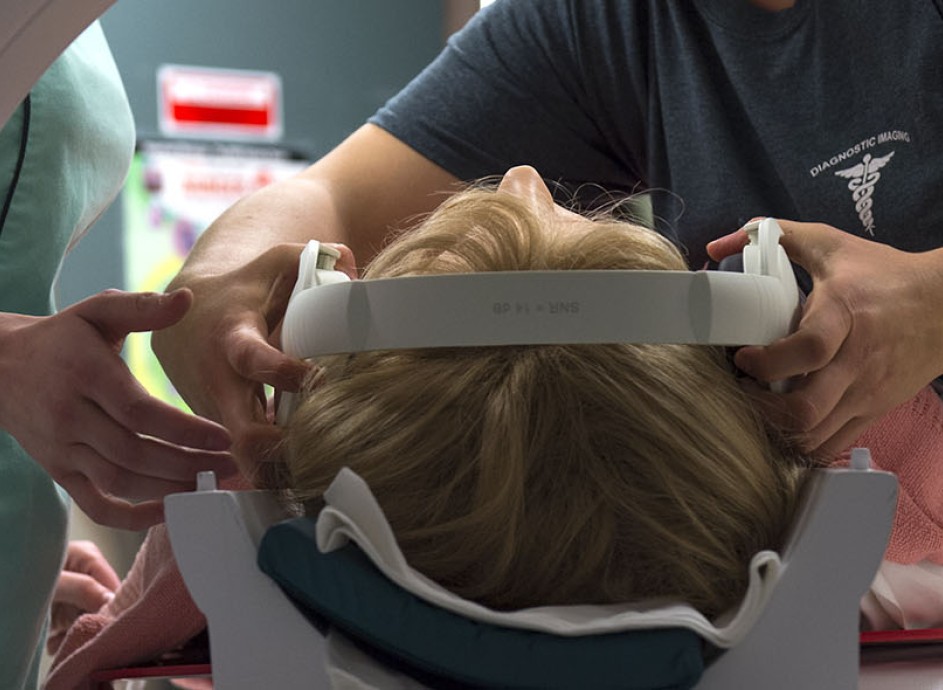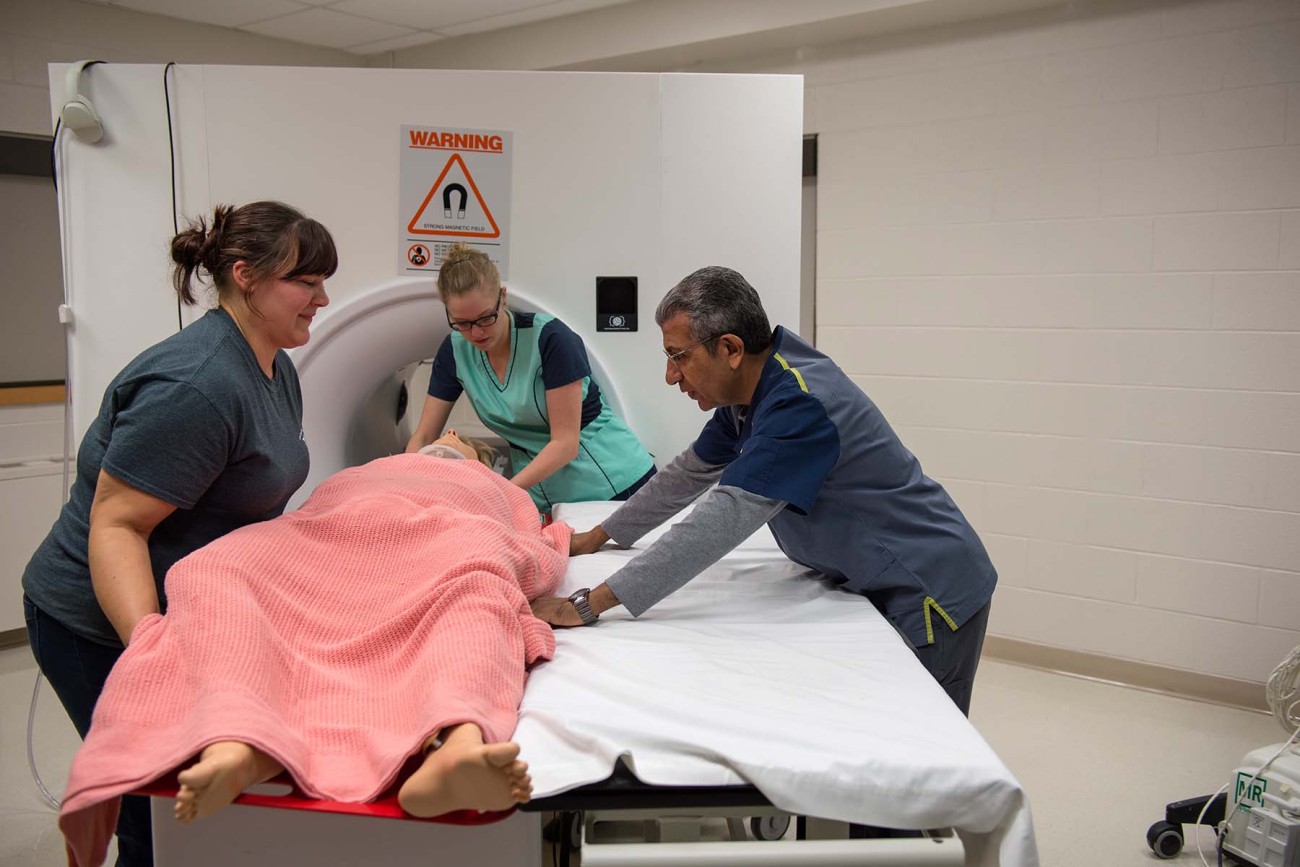Magnetic Resonance Imaging

*Domestic applicants include Canadian citizens, permanent residents, protected persons and Convention refugees.
Thank you for your interest! At this time, this program is currently available to domestic applicants only. Please contact a Fanshawe International Education Advisor to discuss your options.
*Domestic applicants include Canadian citizens, permanent residents, protected persons and Convention refugees.
The Magnetic Resonance Imaging (MRI) program is a one-year graduate certificate that fulfills the educational requirements of the Canadian Association of Medical Radiation Technologists (CAMRT). Applicants must be registered as Radiographers (RTR), Nuclear Medicine Technologists (RTNM), Radiation Therapists (RTRT) or Sonographers (CARDUP) or Magnetic Radiation Technology graduates who are working toward certification (note: these applicants must be certified before they start the MRI program). This program prepares graduates to be clinically competent, communicate effectively, think critically and apply problem-solving skills in the clinical environment.
This online program provides the opportunity for technologists to develop discipline-specific knowledge that is coupled with a clinical practicum. Classes/labs are three days per week, allowing students to maintain employment while growing professionally. Two-15 week levels consist of courses that provide a thorough foundation in MR safety, physics, patient care, procedures, pathology and cross-sectional anatomy. Students will learn from registered MRI practitioners and use simulation software during labs.
Level three of the program includes a full-time 15-week clinical rotation (560 hours) where students are placed in an inpatient/outpatient facility allowing them to develop the valuable skills necessary for an entry-level practitioner. The last component is the Consolidation and Review course that prepares students for the national certification exam.
Our MRI program is currently in the process of registering with Accreditation Canada/EQual. This registration reflects our commitment to providing quality education that aligns with accreditation and regulatory standards. Registration status does not imply accreditation or guarantee future accreditation. For more information about our registration status and its potential impact on your future professional practice, we encourage you to reach out to the School of Health Sciences at Fanshawe College.
Graduates of Fanshawe’s Magnetic Resonance Imaging program find employment as MRI technologists in hospitals, medical clinics, research facilities and private industry settings across the county. In Canada, there is a widespread shortage of technologists across all imaging modalities, particularly MRI. Therefore graduates of this program can expect many exciting career opportunities with competitive compensation.
Did you know Fanshawe consistently ranks high in graduation employment rates among large colleges in Ontario?
Here is an example of an employment opportunity Career Services has received for students and graduates of Fanshawe’s Magnetic Resonance Imaging program:
Magnetic Resonance Technologist
Perform all required MRI examinations as prescribed by physicians or radiologists.

The graduate has reliably demonstrated the ability to :
Rajeev Nair
Medical Radiation Technology Ontario College Advanced Diploma
with a current Certificate as a member of the Canadian Association
of Medical Radiation Technologists (CAMRT) in:
- General
Radiography
- Radiation Therapy
- Nuclear
Medicine
- General
Sonography
OR
A Bachelor's Degree with a current Certificate as a member of the
Canadian Association of Medical Radiation Technologists (CAMRT)
in:
- General
Radiography
- Radiation
Therapy
-
Nuclear Medicine
- General
Sonography
Applicants whose first language is not English will be required to demonstrate proficiency in English by one of the following methods:
The following items are applicable to the program and are time sensitive. Please refer to www.fanshawec.ca/preplacement for important information about preparing for placement by the due date.
| Level 1 | ||||
| Take all of the following Mandatory Courses: | ||||
| MRIP-6006 | Patient Care & Safety for MRI | 3 | ||
| This course provides the fundamental patient care skills necessary to maintain a safe environment for patients as well as other persons in the MRI department. Students will be introduced to the role and responsibilities of an MRI technologist including abiding by the code of ethics and standards of practice. Students will also be introduced to MRI safety screening, zoning, bioeffects and emergency procedures in the MRI environment. Other patient care topics include: patient transfers, infection control, intravenous injections and pharmaceuticals related to the MRI practice. The knowledge and skills gained in this course will provide learners with the necessary skills to safety care for patients and other persons in any MRI department. | ||||
| MRIP-6007 | Physics for MRI | 5 | ||
| This course focuses on MRI (Magnetic Resonance Imaging) physics and instrumentation/equipment. Topics include theory and application of MRI instrumentation, pulse sequences, imaging parameters and options, as well as their corresponding impact on image production and contrast. Principles of parameter manipulation, image formation, reconstruction, and analysis will be presented. | ||||
| MRIP-6008 | Anatomy for MRI | 4 | ||
| This course focuses on the study of human anatomy as seen in multi-dimensional planes for the neurologic, thoracic, abdominal, pelvic, musculoskeletal, and vascular systems. Application of anatomical knowledge will be applied to MR images and other clinical imaging modalities. | ||||
[1] Total program costs are approximate and subject to change. They do not include additional fees such as the health and dental plan, bus pass, or general expenses. Learn more about ancillary and additional fees.